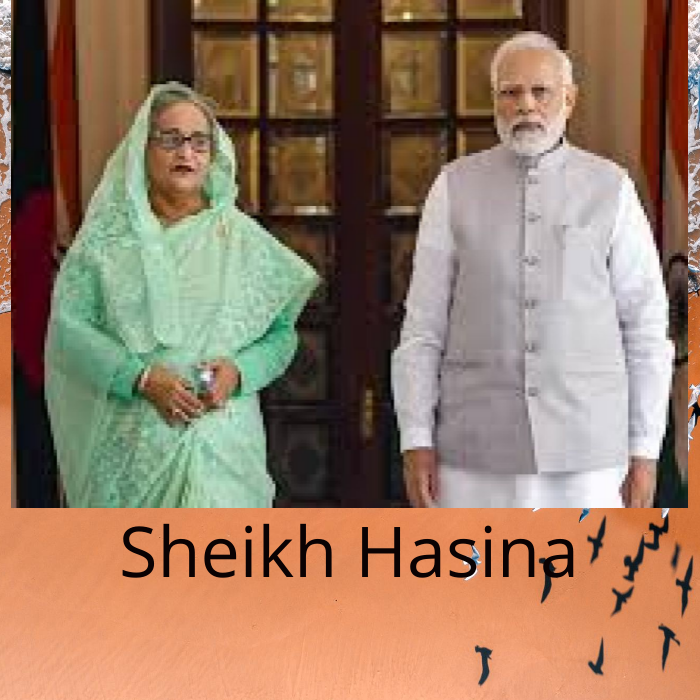Sheikh Hasina
Sheikh Hasina15-year rule came to an end on Monday as Sheikh Hasina, the longest-serving prime minister in Bangladeshi history, left the nation. This followed an unprecedented protest wave that successfully toppled her government. Sheikh Hasina was removed from office after weeks of nonstop protests and altercations with security personnel, which have resulted in about 300 fatalities since mid-July, according to accounts from the local media.
Students who were fed up with the government job quota system started the protests as nonviolent demonstrations. They did, however, unpredictably turn into a major uprising against Sheikh Hasina and the Awami League, her ruling party. The world’s longest-serving female head of state, the 76-year-old leader, held power in January following an election that was boycotted by the main opposition due to concerns that it wouldn’t be free or fair. However, the current unrest has proven to be her most serious and final crisis.
The Beginning of It All
Sheikh Hasina took office as prime minister for the first time in 1996, came back in 2008, and held the position till this past Monday. According to those who have tracked her career, tragedy had a major role in her political life. Sheikh Hasina father, Sheikh Mujibur Rahman, was slain in a military coup on August 15, 1975, marking the beginning of Bangladesh’s independence.
That terrible evening, Sheikh Hasina, 28, was visiting her younger sister in Germany when a gang of army officers stormed into their Dhaka home and murdered her parents, three other siblings, and domestic help, for a total of eighteen casualties.
Some claim that this heinous deed motivated her to amass unparalleled power. According to analysts,Sheikh Hasina was motivated by this incident throughout her political career.

Prior to the general election in January, Avinash Paliwal, a former university lecturer with expertise in South Asian strategic affairs, stated, “Sheikh Hasina has a very powerful trait as a politician – weaponizing trauma.” For Hasina, her father was the driving factor behind Bangladesh’s independence from Pakistan in 1971 when its forces triumphed with India’s assistance.
Following her killing, Hasina spent a number of years living in exile in India before returning to Bangladesh to assume leadership of the Awami League. She was placed under house arrest by the military government of the nation in the 1980s, nevertheless, and she didn’t hold the position until after the 1996 general election.
Two Ladies, Two Gatherings
Hasina and former prime minister Khaleda Zia, who is currently unwell and under house arrest and is the leader of the main opposition Bangladesh Nationalist Party (BNP), engaged in a decades-long power battle.
For many years, the two women took turns leading the nation, which led to a savage rivalry that divided Bangladeshi politics. As a liberal and secular party, Hasina frequently accused the BNP of supporting radical extremists, which it sought to suppress; on the other hand, the BNP maintained that the Awami League employed harsh methods to maintain its hold on power.
Each side laid blame on the other when the recent protests descended into violence. The BNP, which was backing the student demonstrators, demanded that Hasina resign on several occasions, claiming that she was instigating violence.
They asserted that the BNP and another opposition party that her administration had recently outlawed were behind the protests.
Years of Unrest
Hasina took the forefront of the opposition after losing the general election in 2001. For many years until her reelection, she was kept out of power by political violence, unrest, and military intervention.
When she came back to power, she concentrated on the economy and created infrastructure that Bangladesh had never seen before. This comprised large-scale infrastructure like ports, railroads, and highways as well as a reliable electrical grid that reached distant settlements. The nation’s apparel sector rose to become one of the most competitive in the world.
Other advancements were aided by development: more women entered the workforce and females received an education comparable to that of boys. Hasina was characterized by those close to her as a driven individual who fought for the rights of underprivileged people and women.
Hasina made friends with strong nations like China and India while she was active in the world arena. However, tensions with the US and other Western nations arose from worries over breaches of press freedom and human rights. The US and the UK declared the election to be neither credible nor fair when she won a fourth term in January. There were allegations of vote-rigging in the previous elections in 2014 and 2018, as well as opposition boycotts.
Her government has been under fire for years for allegedly employing draconian measures to stifle dissent, restrict press freedom, and weaken civil society. Human rights organizations have also brought up the government-denied enforced disappearances of critics.
Growing Demonstrations
As these rallies started, analysts noticed that her government took an equally tough position, which increased tensions.
The recent global recession made Bangladesh’s economic unrest, which was spearheaded by students, worse.
